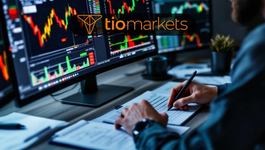Trading Basics: What It Is and How It Works | TIOmarkets
BY TIOmarkets
|June 6, 2024Understanding the fundamentals of trading is essential for anyone looking to navigate the complex world of financial markets. This article aims to demystify the concept of trading, exploring its mechanisms, the different types of trading accounts, and how they operate. By providing a clear and concise overview, we hope to equip you with the knowledge needed to make informed decisions in your trading journey.
Introduction to Trading
At its core, trading involves the buying and selling of financial instruments within financial markets. These instruments can range from stocks and bonds to commodities and currencies. The goal of trading is to generate profits by taking advantage of price movements in these instruments.
What Are Financial Markets?
Financial markets are platforms where traders and investors can buy and sell financial instruments. These markets are critical for the efficient allocation of resources in an economy, facilitating the transfer of funds from savers to those who seek capital.
There are various types of financial markets, including stock markets, bond markets, and forex markets, each serving different purposes and offering different instruments for trading.
Types of Trading
Trading can be classified into several types based on the timeframe and strategy used by the trader. The most common types include day trading, swing trading, and position trading.
Day trading involves buying and selling financial instruments within the same trading day. Swing trading focuses on capturing price movements over a period of days to weeks. Position trading is a longer-term strategy, where trades are held for months or even years.
Understanding Trading Accounts
Trading accounts are essential for anyone looking to trade in financial markets. They act as a bridge between the trader and the market, providing a platform for executing trades.
Standard Trading Accounts
Standard trading accounts are the most common type of accounts offered by brokers. They allow traders to buy and sell financial instruments, typically requiring a minimum deposit to start trading.
These accounts come with various features and limitations, including leverage and margin requirements, which can significantly impact trading strategies.
Unlimited Leverage Accounts
Unlimited leverage accounts are a novel concept in the world of trading. They allow traders to maximize their trading potential by offering the ability to trade without the conventional constraints of margin requirements.
This account type provides traders with the flexibility to use their entire capital for trading purposes, enhancing their ability to execute larger trades and potentially realize higher profits. However, it also comes with increased risks, necessitating careful risk management strategies.
Risks and Rewards of Trading
Trading in financial markets involves both opportunities and risks. Understanding these is crucial for anyone considering trading as a part of their financial strategy.
Opportunities in Trading
Trading offers the potential for significant profits, especially for those who are able to navigate the markets effectively. It provides flexibility in terms of trading strategies and the types of financial instruments that can be traded.
Additionally, trading accounts with features like unlimited leverage can amplify buying power, allowing traders to maximize their capital efficiency.
Risks in Trading
However, trading also comes with risks. The possibility of amplified losses, especially with high leverage, is a significant concern. Market volatility can lead to rapid price movements, potentially resulting in substantial losses.
It is also important to consider the risk of over-leveraging, where traders may expose themselves to excessive risk in pursuit of higher profits. This underscores the importance of prudent risk management in trading.
Additional Strategies for Trading Success
Aside from the common types of trading such as day trading, swing trading, and position trading, there are other strategies that traders can employ to enhance their chances of success in the financial markets.
One such strategy is algorithmic trading, which involves using computer programs to execute trades based on predefined criteria. This automated approach can help traders capitalize on market opportunities with speed and efficiency.
Another strategy is social trading, where traders can interact with and replicate the trades of more experienced investors. This can be particularly beneficial for novice traders looking to learn from seasoned professionals.
Algorithmic Trading
Algorithmic trading, also known as algo trading, utilizes algorithms to automatically place trades based on specific conditions. These algorithms are designed to execute trades at optimal times and prices, removing human emotions from the trading equation.
By leveraging algorithmic trading, traders can take advantage of market inefficiencies and react to market changes swiftly, giving them a competitive edge in the fast-paced world of trading.
Social Trading
Social trading platforms allow traders to connect with each other, share insights, and even replicate the trades of successful investors. This form of trading leverages the collective wisdom of a community, enabling less experienced traders to learn from the strategies of more seasoned professionals.
By participating in social trading networks, traders can access a wealth of knowledge and potentially improve their trading performance by following the strategies of top traders in the community.
Conclusion
Trading in financial markets offers a pathway to potentially realize profits through strategic buying and selling of financial instruments. However, it requires a solid understanding of the markets, the different types of trading accounts, and the risks involved.
By carefully considering these factors and employing effective risk management strategies, traders can navigate the complexities of the financial markets and work towards achieving their trading objectives.
Start Your Trading Journey with TIOmarkets
Ready to put your trading knowledge into action? Join the 170,000+ traders in over 170 countries who have chosen TIOmarkets as their trusted forex broker. With access to over 300 instruments across 5 markets, our low-fee online trading platform is designed to help you trade Forex, indices, stocks, commodities, and futures markets with confidence. Enhance your skills with our comprehensive educational resources and step-by-step guides. Take the first step towards achieving your trading objectives by creating your trading account today at TIOmarkets.

Risk disclaimer: CFDs are complex instruments and come with a high risk of losing money rapidly due to leverage. You should consider whether you understand how CFDs work and whether you can afford to take the high risk of losing your money. Never deposit more than you are prepared to lose. Professional client’s losses can exceed their deposit. Please see our risk warning policy and seek independent professional advice if you do not fully understand. This information is not directed or intended for distribution to or use by residents of certain countries/jurisdictions including, but not limited to, USA & OFAC. The Company holds the right to alter the aforementioned list of countries at its own discretion.
Join us on social media

Behind every blog post lies the combined experience of the people working at TIOmarkets. We are a team of dedicated industry professionals and financial markets enthusiasts committed to providing you with trading education and financial markets commentary. Our goal is to help empower you with the knowledge you need to trade in the markets effectively.
Related Posts





